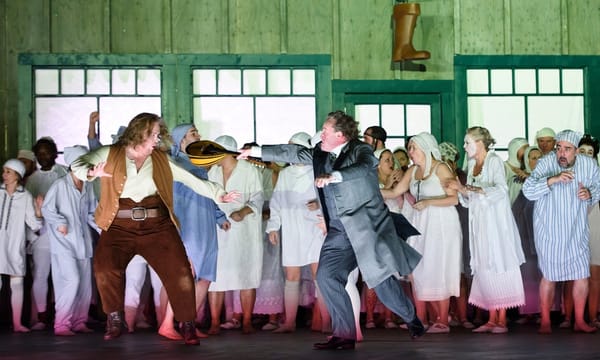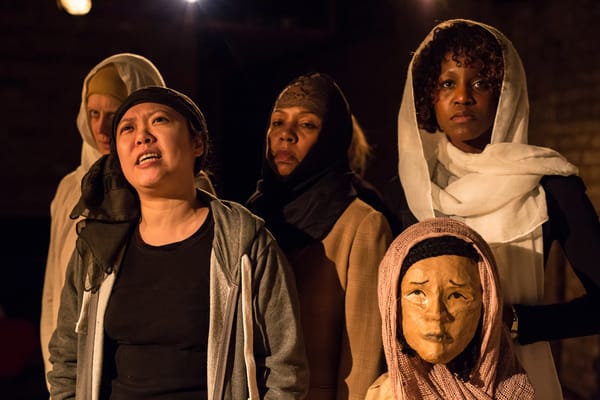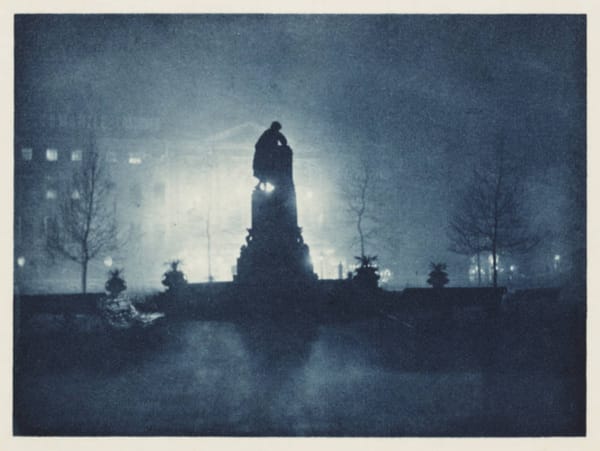Interview: Jon Haynes in Conversation
The co-artistic director of renowned theatre company Ridiculusmus speaks to Max Falkenberg about schizophrenia, the creative process, the brutality of arts funding and throwing tomatoes at comedians.
The afternoon I meet Jon Haynes on Bond Street, I really should have better things to be doing. With a lab report due in 24 hours and a rehearsal to plan for later in the day, this interview couldn’t come at a much worse time. But this opportunity is too good to miss. With numerous awards and an enviable reputation as the pioneers of “seriously funny theatre”, Ridiculusmus is at the forefront of British fringe theatre and I’m chatting to the man behind half of their creative vision. Gaunt and serious looking, Jon has something ominous about him. As their website tells us, Jon won awards at school for speaking Greek verse; and after taking drugs at university and having a nervous breakdown, Jon founded Ridiculusmus with his partner David Woods. Somehow I get the feeling that Jon is the serious part of their “seriously funny” dynamic. That said, he strikes me as a pretty good guy.
Founded during their time at The Poor School in the 80s, Jon, David and their partner Angus started out busking comic songs from the 20s and 30s. Although little came of it, a free room above a couscous restaurant in Kentish Town saw the trio open The Tomato Club. Named after the section where they would invite comics who “considered themselves bad enough to appear”, the audience were armed with overripe tomatoes and the rest you can guess. Although the idea sounds funny, Time Out didn’t agree saying “the publicity advises “don’t come”… sounds like advice worth taking”. But it wasn’t their comedy that got them kicked out. As Jon tells me, the restaurant asked them to leave after tomato seeds started dropping through the floorboards. I guess the joke had gone too far, but to me it almost feels like that’s what Ridiculusmus’ brand of anti-comedy is all about.
Jon Haynes is one of the pioneers of seriously funny theatre
In much the same fashion, their first full show bombed spectacularly. Having by chance been offered to fill a slot at the Canal Café Theatre but with no show to put on, the trio rustled up an adaptation of Three Men in a Boat, mainly because it had three men in it – what other reason do you need?! Well I guess many other reasons since, as Ian Shuttleworth put it, “They’ve seriously underestimated what it takes to whip up some light frothy entertainment”. Picking out Jon for some personal praise, Shuttleworth wrote: “When he leaves the stage it seems more full”. High praise for the other two I guess.
The relationship between performers and critics has always been a little odd. On one hand, performers are often reliant on critics to reach the next level with their art and many are successful as a result. But, as Jon puts it, “you get a 1 star in the Guardian, your show is done for”. So you wouldn’t have blamed the trio for giving up there, but they remained adequately stubborn. With a suggestion to perform The 3rd Policeman from an audience member, an absurd, surrealist play almost perfectly suited to the trio, Ridiculusmus as a serious company was born. With an extensive tour and the support of a few more enlightened critics, the company set up as a resident company in Derry, Northern Ireland.
The relationship between performers and critics has always been a little odd
With a small amount of funding and an urge to relieve some boredom, the trio began working on more experimental methods for devising original work and came up with The Exhibitionists. Although reasonably successful, the show left them unsatisfied. In an attempt to perform an Indian epic, audiences started walking out, and with Jon’s personal life starting to collapse, the company seemed at risk. Having been briefly sectioned during his time at university in Sheffield, Jon felt alienated in Northern Ireland. Angus left the trio to move into filmmaking, and after a painful stint living in an industrial unit in Belfast, the duo decided to risk everything on two shows at the Edinburgh fringe in 1999. Although the book Jon sends me after the interview paints a rather bleak picture of their time in Northern Ireland, Jon tells me that it was there that Ridiculusmus finally discovered their artistic vision. “Seriously funny theatre” was born.
The Exhibitionists & YesYesYes opened to rave reviews with YesYesYes garnering a number of top awards including Time Out ‘Best Off West End production’ in 2000 and Total Theatre’s award for ‘Best British Production’. With a smattering of fresh publicity and an extensive tour across the UK and abroad, YesYesYes gave Ridiculusmus their first chance at real funding and linked them with a number of big players.
Over the last 15 years, Ridiculusmus have continued the artistic vision that gave them their first break. Focussing on a number of two-handers, Jon tells me a little about the creative process behind the majority of his work; starting out on a project, the team usually have very few ideas set in stone. With little more than an idea about the number characters, a week is spent improvising, sometimes with a number of collaborators, sometimes just the two of them. Recording all the material, Jon tells me that they “transcribe everything, no matter how banal and shit, word for word, um for um”. A little odd, but Jon swears to me it works. “Philip Roth used to spend a year writing 8 hours a day – total shit”. The main talent of the writer was putting up with your own shit – “God this is terrible!” But after a year – or in Ridiculusmus’ case, a week – they’d come back and try to pick out anything that had a little life. Jon tells me they’re looking for conflict or drama; I’m pretty sure they’ve found it.
With the few sparks of life picked out and a core idea to work on, Jon and David can spend months to years researching their ideas. With no director, touring becomes an intrinsic part of the creation process: “Working the show out as we perform to an audience, in a way the audience become our director”. The audience’s immediate response lets the duo work out line for line what’s funny and what’s not.
When they started out on The Eradication of Schizophrenia in Western Lapland, the duo had only settled on two things; they wanted to work with collaborators and they wanted to base something on a family. With a week dedicated to development work at the National Theatre Studios, it became clear that mental health was a recurring theme in their improvisations. David’s father had exhibited psychosis while he was growing up before his brother also discovered that he had “the gene that makes you flip”.
When starting out on a project, the team usually have few ideas set in stone
“I think that’s where madness starts, amongst the pieces and the teacups”, Jon notes while talking about the focus on the family. While he tells me his time in a psychiatric ward didn’t particularly influence the production, he recalls that there was a man on his ward who would tell rambling tales about how the novelist John Fowles having stolen his wife; Jon didn’t believe any of it, but years later what he had thought of as delusions turned out to be all true. Were his character’s delusions in Eradication all meant to be true? Of course not, but the implication is rather amusing.
Two years and one script later, the show began touring, and as you can imagine with such a touchy subject, responses to the depiction of psychosis were mixed. “A schizophrenic was not happy with me saying, “It’s not like that, it’s not like that. You need to be a lot more worked up.”” Others argued that delusions were very personal, internal things; if you’ve been through psychosis, it is understandable not wanting to be represented on stage. But in their challenging position as theatre makers, Jon insists that Ridiculusmus’ ultimate goal is to entertain. Even if the subject matter is bleak, you want to make people laugh.
Set up so that the two performances were running simultaneously, Jon describes the challenges of such a complex play. “The problem is trying to act this very weird script where you’re trying to be in the moment on one side but need to fully pay attention to the other side…you can never really get lost in the piece in the typical method acting way”. As Jon points out: “there’s no rule about what mental illness should be”, and certainly not in how it should be depicted.
The fiscal sadism of the government means there just isn’t enough money
And from that springboard, Jon tells me about Ridiculusmus’ next project. With Eradication having been the first part, the duo are now focussing on the second instalment in a trilogy on alternative discussion-based therapies for mental health. With trials running in South Carolina, the treatment of therapy-resistant PTSD in war veterans is the theme for their next instalment. Premiering at the Melbourne Festival in autumn, the performance will see Jon playing a veteran living in a box in his kitchen with David out the back door trying to convince Jon to have the MDMA treatment.
But even with the best intentioned plans, an ominous thought hangs over our discussion. Jon tells me that they’ve recently been rejected for funding from the Arts Council. Although Jon insists the Arts Council value Ridiculusmus, apparently they are better suited to a project based funding model: “The fiscal sadism of this Government’s slashing means there just isn’t that much money to go around”. Having lost their spot at the Barbican’s Pit Theatre due to funding, and with no manner in which to sustain the company without external support, Jon fears they might have to close. “If we don’t get [the project funding], I don’t know what we’re going to do... It’s a fragile existence”. Without the funding to carry out their research, who knows whether they will be around at all in a couple of years. I certainly hope they are. Their work may not be conventional, but Ridiculusmus’ creative vision is unique, and we cannot underestimate how important that is for the arts today.
Towards the end of our discussion, Jon tells me about an article written recently by David Edgar. Entitled Death of the Playwright, the article argues that the devised theatre is pushing out the old idea of the playwright. But that’s not the point. Theatre is a collaborative art and all that matters is the end product, what is shown on stage and what people will remember. While Edgar might be right that devised work often is poorly thought out, Ridiculusmus’ complete devotion to their art and incredible focus in creating work is too valuable to the British theatre scene to just lose overnight.








